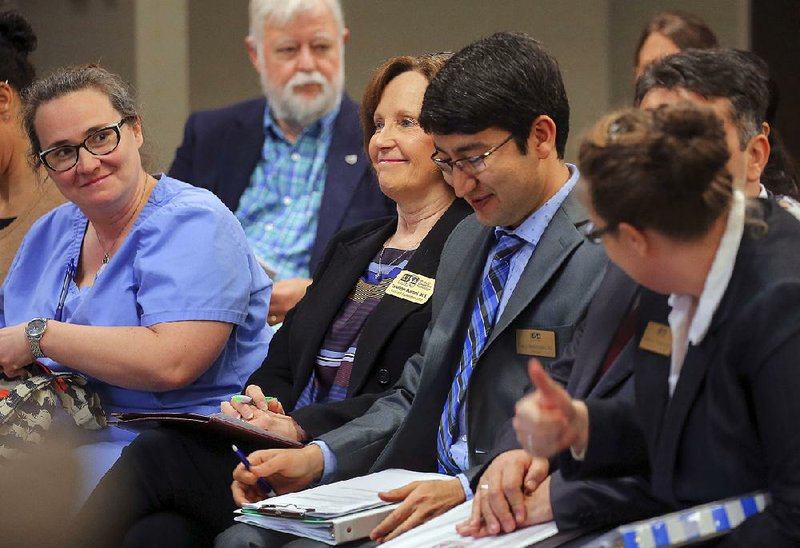A proposal by LISA Academy Public Charter Schools to add a secondary-school campus in Sherwood and increase its enrollment cap for all of its schools by 600 students to 2,700 won unanimous approval Thursday from the state's Charter Authorizing Panel.
The expansion plan from the state's largest charter school system will now go to the Arkansas Board of Education on March 8 for final action. The Education Board has the authority to accept the charter panel's decision or conduct a hearing on the plan -- either on its own initiative or at the request of the local school district -- before making a final decision.
The LISA Academy system, which has campuses on both sides of the Arkansas River, applied for an amendment to its state-issued charter to construct an estimated $13 million building behind its kindergarten-through-12th-grade school at 5410 Landers Road.
The two-story building on Briley Drive, designed by WER Architects/Planners of Little Rock, would house either grades six through 12 or seven through 12 beginning with the 2019-20 school year.
The existing school would be repurposed for an elementary-only school.
Superintendent Fatih Bogrek said in the system's application and in an interview Thursday that the new building would not only help relieve the LISA Academy North's 2,000-student waiting list but also provide needed space for science, technology, engineering and math programs to grow. With the expansion, there will be less reliance on online courses and more on traditional face-to-face instruction.
"LISA Academy-North, k-12, is stuck all in one building, so to have an effective system and to help meet the demand, we want to expand," Bogrek said. "We are very lucky to find available land next to our school," he said, adding the inclusion of a full-size gymnasium in the building project will be another benefit to the school in terms of space for projects, performances and extracurricular activities.
Bethany Ratermann, principal of LISA Academy-North's elementary school, told the panel Thursday that parents are anxious for their children to enroll in LISA's north campus in part because of the school's 100 percent graduation rate and college-acceptance rates.
Valerie Martin, a parent of three at the campus, said she was motivated to enroll her oldest as a kindergartner years ago because she wanted a school that recognized well-behaved students and featured a diverse study body.
Jorge Galvan, a 10th-grader who is participating in national contest to design a working solar car, said the school has just about everything he needs for success.
There was no opposition Thursday from traditional school systems to the proposed campus.
Charter schools and traditional school districts -- both supported with taxpayer dollars -- compete for the same students and state aid.
There are currently 12 charter school systems operating in Pulaski County, some with a single campus and others with multiple campuses, serving 8,232 of the county's 55,404 total public school students. Two new charter schools are approved to open in the coming 2018-19 school year in Little Rock plus the existing eStem Public Charter School System is expanding by opening an elementary and junior high in east Little Rock in the coming school year. A new charter school also has been approved for Little Rock for opening in the 2019-20 school year.
Mike Hernandez, charter authorizing panel member and state superintendent for the Office of Coordinated Support and Service, asked if the 600-student increase in the LISA Academy cap would be restricted to the LISA Academy-North campuses.
Alexandra Boyd, the Education Department's director of public charter schools, said the 600 new spots are not limited to the north campus but the school is restricted in adding students to campuses on the south side of the river by the capacity of the buildings there.
Jeremy Owoh, the state Education Department's assistant commissioner for teacher effectiveness and a charter authorizing panel member, said he was impressed with his recent visit to LISA Academy-North. His conversations with students indicated that they had taken "ownership" of their educations and could articulate what it meant to be college and career ready.
Kathi Turner, deputy director for career and technical education at the Arkansas Department of Career Education, urged LISA Academy leaders to work with her state agency as it enlarges its career-education programs.
The new facility is to have 25 classrooms, a regulation gym/performance hall, space for hands-on learning projects plus laboratories dedicated to engineering, chemistry, and medical sciences. Art and music rooms, a cafeteria and 15 offices also are planned.
Once the secondary students are removed, the elementary school will be able to expand its services and programs. There will be space for additional therapists, small group interventions and instructional initiatives, such as Project Lead the Way. Fourth and fifth grades would be departmentalized, meaning that each teacher would specialize in an academic area and teach that subject to all the students in the grade.
Currently, LISA Academy-North has an enrollment of 801 in kindergarten through 12th grades, with 233 in middle school and 174 in high school. That is projected to increase to 1,400 total for the north campuses by 2021-22, with 800 in elementary, 250 in middle school and 350 in the high school.
Little Scholars of Arkansas (LISA) LLC will issue bonds to generate the money for the construction and possibly to buy the existing building. Both buildings would be leased to the LISA Foundation, the nonprofit sponsoring organization.
LISA Academy was first authorized by the state in 2004 for a Little Rock location. The north-side campus was approved in November 2007. The system's charter expires in 2030 but can be renewed.
Metro on 02/16/2018


